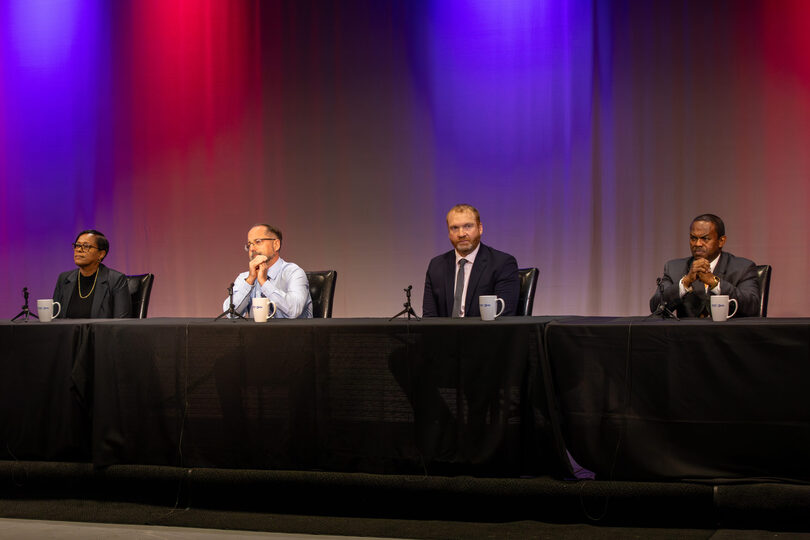Syracuse mayoral candidates tackle local issues, Trump admin at Oct. 14 debate

Syracuse’s mayoral candidates — Democrat Sharon Owens, Republican Tom Babilon and independents Alfonso Davis and Tim Rudd (left to right) — discussed local and national issues at an Oct. 14 debate. Leonardo Eriman | Photo Editor
Get the latest Syracuse news delivered right to your inbox.
Subscribe to our newsletter here.
Deputy Mayor Sharon Owens, sat alongside the three other candidates vying to be elected Syracuse mayor in November, faced and rebutted numerous challenges from her opponents over the course of an hourlong debate Tuesday.
At the debate, candidates — Democrat Owens, Republican Tom Babilon and independents Alfonso Davis and Tim Rudd — discussed city finance, education and housing, which at times overlapped with conversations about federal policies and President Donald Trump’s administration.
Owens spent much of the debate playing defense as the other candidates, each asserting they were the solution for a city in need of change from its current leadership, targeted her and the incumbent Ben Walsh administration she is part of.
“My very existence makes me as far away from the status quo as you can be,” she said after Rudd called her a “manager and administrator of the status quo.” If elected, Owens would be Syracuse’s first Black mayor.
In most instances, Owens, the front-runner, stood behind her record and the Walsh administration. Owens, a Syracuse University alum, is running as a Democrat and member of the Working Families Party.
The other candidates, particularly Rudd, criticized Walsh and his administration’s credibility. Rudd was fired from the city’s budget office in February following comments he made about Owens.
The debate was held at WCNY’s studio and moderated by David Lombardo, host of WCNY’s The Capitol Pressroom, Chris Baker, syracuse.com’s public affairs editor, and Nina Moore, a political science professor at Colgate University.
Moderators began with questions about Syracuse’s relationship with Trump and the federal government. All four candidates said they would not have city police working alongside Immigration and Customs Enforcement agents, although all differed on their reasons why.
“It is not the role of the police, and our taxpayers do not pay our police officers to be ICE agents,” Owens said. “So no, we will not engage in ICE activities with me as mayor.”
The Syracuse Police Department, Babilon said, can’t legally work with federal agents and lacks the resources to do so, while Davis said the city should not support ICE in “any facet.” Rudd, also an SU alum, said Syracuse should remain a “diverse and welcoming city,” but should be marketed as a “safe harbor” from the federal government.
In a yes-or-no segment, all four candidates agreed Syracuse should not remain a sanctuary city, rebuking a 2017 declaration made by former Mayor Stephanie Miner.
Throughout the debate, candidates quarreled over finances, both the city’s budget and the shifting relationship between the federal government and states. Syracuse is one of many cities in states represented by Democrats that have lost millions in federal funding since Trump took office.
While discussing federal funding, Babilon said Syracuse needs to manage the grants it has. Rudd said the city should improve its transparency with money, taking the opportunity to bash the Walsh administration’s handling of a payroll modernization initiative.
Owens agreed with Babilon that the city needs to effectively manage its grants, saying Syracuse’s relationship with New York state is “critical,” and pointed to her existing relationship with state officials.
Babilon, a former city hall lawyer, suggested Trump may be more sympathetic to the city with a Republican mayor, saying he would “facilitate a better relationship with the federal government.”
Davis said he would focus on liaising with New York elected officials rather than the president and on trimming the budget. Davis, who has been on the ballot multiple times, was removed from the Democratic ticket earlier this year and returned as an independent.
When asked to offer recognition to Trump, both Owens and Babilon celebrated the release of the final Israeli hostages from Hamas captivity. As for criticisms, Davis said he saw no positives and condemned the president’s suppression of speech that is not “favorable to him.” Owens called the deployment of National Guard troops into American cities “overarching government interference.”

Leonardo Eriman | Photo Editor
The Oct. 14 was moderated by David Lombardo, host of WCNY’s The Capitol Pressroom, Nina Moore, a political science professor at Colgate University, and Chris Baker, syracuse.com’s public affairs editor (left to right).
Moderators asked questions about Syracuse’s spending and taxes, including the Syracuse Common Council’s budget cuts and rejection of Walsh’s 2% tax hike earlier this year. The candidates laid out competing visions of what the city’s spending and taxing should look like.
Owens said she was “not in agreement” with Walsh’s decision to push forward another tax increase this year, a rare moment when she opposed the mayor during the debate. However, she said the administration had a plan “keyed up to be done” for the city’s property tax revaluation before the Common Council voted it down.
Both Davis and Owens said less than half of Syracuse’s population pays all of the city’s taxes. Both Babilon and Davis said taxes are increasing, but Davis suggested tax-incentivized businesses should pay more, while Babilon said unnecessary government spending is creating tax hikes.
“I think we’ve had too much tax increases in the past eight years,” Babilon said. “We’ve had three tax hikes from this mayor, he wanted to do five, the council stopped him twice.”
Davis, later in the debate, also defended his “commuter tax” proposal, which would generate revenue by taxing all city employees who do not live in the city.
Babilon, responding to a question on whether he would use the reserve to balance the budget, said the city needs to examine its “waste.” Rudd, who worked for the Walsh administration’s budget office, said the budget could “get a lot worse,” and he would cut “do-little” government employees rather than use the reserve.
Each candidate, except Owens, said they would eliminate the deputy mayor position or similar government roles. Owens, current deputy mayor, said she would instead reduce vacancies to limit the government budget. She pointed to city assets after she was asked for a way she would raise revenue, while the other candidates said sales tax.
Rudd, amplifying his characterization of the Walsh administration, said an expanded Department of Assessment would help identify unnecessary spending and curb tax increases. Owens jumped in, saying Rudd was “repeatedly calling me dishonest.”
“I pride myself with my integrity and my honesty,” she said.
In one rapid-fire segment, candidates gave the Common Council a grade. Owens and Davis gave the body a ‘C+’ and Babilon gave it a ‘B’ for the current year. Rudd, a former common councilor, gave it an ‘A.’
While discussing housing, Rudd said the city needs for-profit developments.
“You need to activate private investment,” Rudd said. “Too many of the real estate schemes in Syracuse rely on government money, and as a result, they move slowly or not at all. We need to make conditions where people feel confident that they’ll get a return on their investment.”
Owens said the city needs to diversify its housing options. Davis said the city should focus on the landlords and property it already has and suggested dissolving the Greater Syracuse Land Bank, which Babilon said should be run differently.
Candidates generally supported expanding SPD funding, but split on the city’s residency requirements. SPD’s current policy requires new police officers to live in Syracuse for five years after their date of hire, although lateral transfers are exempt.
Owens supported the residency requirement and spoke to the Fowler High School police cadet program. Babilon said the residency requirement, which he alleged was illegal and unenforceable, will be gone “on day one” if he becomes mayor.
Each candidate expressed support for the Syracuse school system, which has some of the lowest test scores in the state, and pointed to solving poverty and high absentee rates as means to improve scores. Davis said the city also needs to encourage vocational programs for students who aren’t college-bound.
In another quick-fire segment, all the candidates but Owens said they opposed Walsh’s efforts to remove Syracuse’s Christopher Columbus statue.
As the debate wrapped up, candidates were asked platform-specific questions. Responding to a question about what she would prioritize differently from Walsh, Owens said she would increase collaboration with the Common Council to work on their shared fiscal responsibilities.
Babilon outlined a path to victory in which Democratic voters, some of whom voted in the primary for Owens’ opponents, propel him to become Syracuse’s first Republican mayor in over 20 years.
“I’ve got better ideas for the city of Syracuse than Sharon does … we’re gonna pull some of the Democratic vote,” he said. “I’ve got better ideas, and we’re gonna win.”
Before voter registration ends and early voting begins on Oct. 25, the candidates will meet for a handful of debates. Next Monday, the four will meet at SU’s National Veterans Resource Center for a debate hosted by CitrusTV. Election day is Nov. 4.





